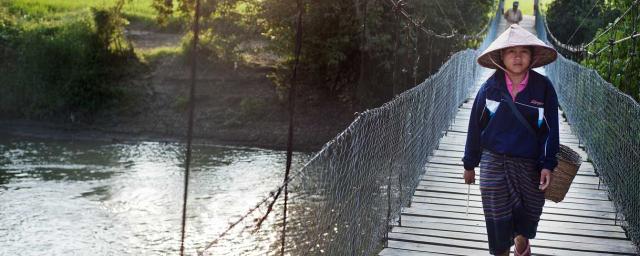
Lao PDR has exhibited an average annual economic growth rate of 7 per cent over the past decade – yet, poverty persists.
Lao is being transformed into a modern, industrialized country, guided by a model that is growth-focused and driven mainly by capital-intensive, export-oriented industries and foreign investment. The space for communities and civil society to operate, flourish, and become influential is very limited; women and girls remain to be the most disadvantaged in the country.
Our goal is to support the development of Laos as an open and just society, where vulnerable women and men are able to participate in its growth and enjoy their rights to sustainable development.
Oxfam's work in Laos
Oxfam's partnerships in Laos have evolved significantly since we started working in Laos at the end of the 1980s. Since the opening up of civil society, Oxfam increasingly supports partner organizations towards increasing citizen’s participation in decisions that affect their lives.
Oxfam continues to partner with Lao government agencies and local authorities on livelihood programs for vulnerable communities.
Citizen Participation and Civil Society Development
We believe that a vibrant, effective and credible civil society sector is important. We support Lao civil society organizations by enabling them to engage and influence the government, as well as the corporate sector, on a principled and sustained way. We do this by conducting multi-dimensional capacity building. We make sure that civil society legitimately represents the poor and marginalized people. Our advocacy agenda is based on need, and backed up by solid evidence derived from our research and development practice.
Gender Justice
We believe that for substantive and durable transformation to occur, change needs to take place at different, mutually reinforcing levels. In Lao, we aim to see more poor and marginalized women become capable of securing greater, sustained access and control of productive resources. We support them to organize and mobilize. We encourage them to exercise their rights by challenging gender discrimination and denial of their rights. We long for a country where women and girls live free from violence.
Bulding Resilient Communities
We believe that addressing existing vulnerabilities, mitigating hazards and risks, and adapting to the impact of climate change require a whole-system capacity building and transformation. We support poor communities in Laos by giving them access to relevant information and resources, so that they will be adequately able to address the challenges they are facing. We work with communities in raising their level of preparedness, and building their capacity to respond for when the next disaster strikes.
Sustainable Development and Responsible Investment
We believe that engagement of the corporate sector towards accountable, inclusive and just growth requires strong communities and civil society as a whole. In Lao, we strengthen the capacity of communities to effectively engage with the corporate sector and on holding corporations accountable. We ensure a conducive policy and practice environment that allows for capable communities and civil society organizations to flourish. We also work towards a more effective regulation of foreign investments.
